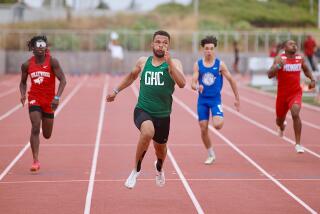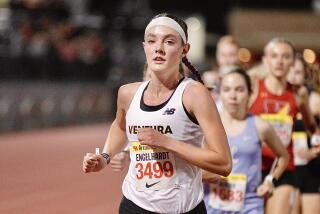Academic Decathlon pushes students outside their comfort zones
- Share via
ALBUQUERQUE — How many of these could you answer?
What is conserved in an inelastic collision? (Momentum.) Where were the Boer wars fought? (Modern-day South Africa.) What compositional technique did the 19th century French Romantic composer Hector Berlioz create? (Idée fixe.) And what is the difference between the surface areas of two spheres with radii of four and six? (80 pi)
The Granada Hills Charter High School students here for the national Academic Decathlon competition have spent months studying the guides those questions came from. And they were striving to answer all of the above — and many more.
The 10-subject decathlon pushes students outside their comfort zones: Math and science whizzes have to give a prepared speech. Book worms have to know science. Plus there’s art, economics, music, language and literature, an impromptu speech, an essay, an interview, and the Super Quiz, a public quiz on history to wrap things up.
To many of the competitors, it’s the mountain of a challenge that draws them in.
“You have to have a firm grasp of all the subjects,” said Kimberly Ly, a Granada Hills team member. “Not just some of them. All of them.”
Matt Arnold, one of the school’s coaches, said the decathlon requires students with endless curiosity who aren’t worried about the failures that come before success.
“Not everybody has it, and it’s important,” he said. “If they don’t acknowledge they are bad at something, they can’t get it.”
And the competition, Arnold said, “shines a bright light on whatever you’re weakest at.”
Lev Tauz is one of the math brainiacs. The opening words to his speech: “I’m a math and science nerd.”
“I was a really bad speaker,” said Lev, a native of Uzbekistan whose first language is Russian. “I couldn’t get the inflections right. I still get some of the words wrong.”
He pointed to the word “math” as an example — he can’t get the “th” sound down. He’s sure his terrible handwriting didn’t help in the essay portion of previous competitions (it’s done online for nationals), and he had struggled with the literature test in the past.
“Everyone has something they are weak on, and it takes courage to admit that you have a weakness and are willing to improve,” the senior said.
He scored more than 9,000 points — out of a possible 10,000 for an individual — in the state competition last month and yet he’s also seen himself grow, becoming more confident and certainly more comfortable as a public speaker.
But it was a long road to Albuquerque.
The season for the Granada Hills team began soon after their predecessors returned from last year’s nationals as the champions. (The school has a new team of nine this year, made up of A, B and C students.) Their coaches eased them in, with only a few meetings per week during the summer.
They soon learned that, at its core, the Academic Decathlon is much more than a battle of wits — it’s really one of endurance.
Sean Wejebe recalled when his coaches said the team would only have a few days off over winter break. “Oh, my God! They were serious? I thought they were kidding,” he said. “I started thinking, ‘How did I get myself into this?’ That’s what makes it so great to be here now.”
They essentially lived in their coaches’ classrooms. They’d pore through guides thicker than a big-city phone book, hone speeches and take practice tests. Then, they’d do it over and over and over again.
“Even though I’ve read this guide 12 times, I’m going to read it 12 more times,” Julia Wall said she told herself.
Julia, one of the team’s C students, had to adjust her entire outlook: Good enough was no longer good enough. That was especially true with math. “It took a lot of sucking it up to take on that weakness,” she said.
They also had to learn how to push themselves, and each other. No daydreaming. No games on their cellphones. No falling asleep. (Sean learned that a good stretch or chewing gum helped avoid nodding off.)
They had to develop the mind-set of a champion. Julia and Jimmy Wu, another C, or “varsity,” student, have a friendly competition to be the first C student to break the 9,000-point barrier.
And Kimberly learned that she sometimes needed to tell herself that she’s actually good at one of her more difficult subjects.
She said she would think: I suck at this, I can’t do it.
“You have to take that away,” she said, and replace it with: I love that subject, I love that subject.
“I started believing it.”
The competition concluded Friday: Granada Hills and Whitney Young Magnet High School in Chicago tied as winners of the Super Quiz. The teams beat out 31 others; the overall winner will be announced Saturday.
More to Read
Sign up for Essential California
The most important California stories and recommendations in your inbox every morning.
You may occasionally receive promotional content from the Los Angeles Times.










